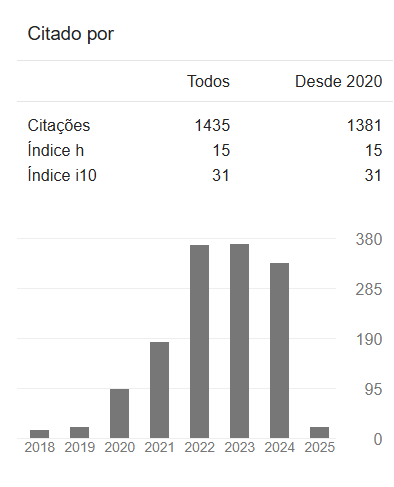POSSIBLE EDUCATIONAL IMPACTS OF DIGITAL GAMES IN THE STUDY OF ENGLISH LANGUAGE
DOI:
10.23926/RPD.2526-2149.2020.v5.n2.p782-800.id744Keywords:
Digital Games, English Language, Tangential LearningAbstract
Digital games are seen as an popular entertainment among young people and adults. This paper aims to identify their potential to contribute to the learning of school content, more specifically the English language, which is the predominant language in these game's market. The data were collected through an investigative study using an electronic questionnaire sent to students of Basic and Higher Education. The responses of 114 participants were analyzed using the qualitative paradigm as a guide. The results show that, although the knowledge of the English language learned in the classroom was important for the setting in the games, the majority of respondents (83.5%) confirm that they have deepened their English skills through this practice. This study points out that this immersion can contribute significantly to the learning of the English language. It is concluded that digital games are important auxiliary tools for teachers of English language to organize their pedagogical practice.
Downloads
Metrics
References
BABBIE, Earl. Métodos de pesquisas de survey. Belo Horizonte: UFMG, 1999.
BREUER, Johannes; BENTE, Gary. Why so serious? On the Relation of Serious Games and Learning. Journal for Computer Game Culture, v. 4, n. 1, p. 7-24, 2010.
BRINCHER, Sandro; SILVA, Fernando da. Jogos digitais como ferramenta de ensino: reflexões iniciais. outra travessia, Florianópolis, p. 42-69, set. 2012. ISSN 2176-8552. Disponível em: http://periodicos.ufsc.br/index.php/Outra/article/view/2176-8552.2011nesp1p42. Acesso em: 17 mai. 2020.
CENTENARO, Franciele Knebel. Investigação de uma abordagem pedagógica para o ensino de língua inglesa por meio de jogos digitais. Dissertação (Mestrado em Tecnologias Educacionais em Rede) - Universidade Federal de Santa Maria, 2016. Disponível em: http://repositorio.ufsm.br/bitstream/handle/1/10683/CENTENARO%2c%20FRANCIELE%20KNEBEL.pdf?sequence=1&isAllowed=y. Acesso em 20 mai. 2020.
CONNOLLY, Thomas, BOYLE, Elizabeth, MACARTHUR, Ewan, HAINEY, Thomas; BOYLE, James. A systematic literature review of empirical evidence on computer games and serious games. Computers & Education, 59 (2012), 661-686. Disponível em: https://www.learntechlib.org/p/167558/. Acesso em 17 mai. 2020.
FLEURY, Afonso; NAKANO, Davi Noboru; CORDEIRO, José Henrique Dell'Osso. Mapeamento da indústria brasileira e global de jogos digitais. [S.l: s.n.], 2014.
GIL, Antônio Carlos. Metodologia do ensino superior. 4. ed. São Paulo: Atlas, 2011.
GONÇALVES, Larissa Magalhães de Almeida. Dante's Inferno: localização e legendagem em jogos digitais. 2016. 179 f., il. Trabalho de conclusão de curso (Bacharelado em Letras - Tradução - Inglês). Universidade de Brasília, Brasília, 2016. Disponível em: http://www.bdm.unb.br/bitstream/10483/17229/1/2016_LarissaMagalhaesGoncalves_tcc.pdf. Acesso em 17 mai. 2020.
KOSTER, Raph. A Theory of Fun for Game Design. Paraglyph Press. Scottsdale, Arizona – USA, 2005.
LEITE, Bruno Silva. Tecnologias no ensino de química: teoria e prática na formação docente. Curitiba: Appris, 2015.
LIMA, Lais Teixeira.; SOUZA, Sonia Maria de Fonseca; LUQUETTI, Eliana Crispim França. O ensino da habilidade oral da língua inglesa nas escolas públicas. Círculo Fluminense de Estudos Filológicos e Linguísticos. Volume 13, nº 10. 2014.
PENICHEIRO, Filipe. Fora de jogo: compreensão histórica e jogos digitais. Disponível em: http://estudogeral.sib.uc.pt/handle/10316/44888. Acesso em 17 mai. 2020.
SMOLKA, Ana Luiza. Bustamante, GÓES, Maria Cecília Rafael de. A constituição do sujeito: uma questão recorrente? In: WERTSCH, James V.; DEL RÍO, Pablo; ALVAREZ, Amélia. Estudos socioculturais da mente. Porto Alegre: Artmed, 1998.
VYGOTSKI, Lev Semiónovich. (1934) Pensamiento y lenguaje. In: Obras escogidas, tomo II. Madri: MEC/Visor, 1993, p. 9-348.
Downloads
Published
How to Cite
Issue
Section
License
Copyright (c) 2023 A Revista Prática Docente tem o direito de primeira publicação

This work is licensed under a Creative Commons Attribution-NonCommercial 4.0 International License.
Authors who publish in this journal agree to the following terms:
- Authors retain the copyright and grant the journal the right of first publication, with the paper simultaneously licensed under the Licença Creative Commons Attribution allows the sharing of the work with acknowledgment of authorship and initial publication in this journal.
- Authors are authorized to take additional contracts separately, for non-exclusive distribution of the version of the work published in this journal (e.g. publish in institutional repository or as a book chapter), with acknowledgment of authorship and initial publication in this journal.











